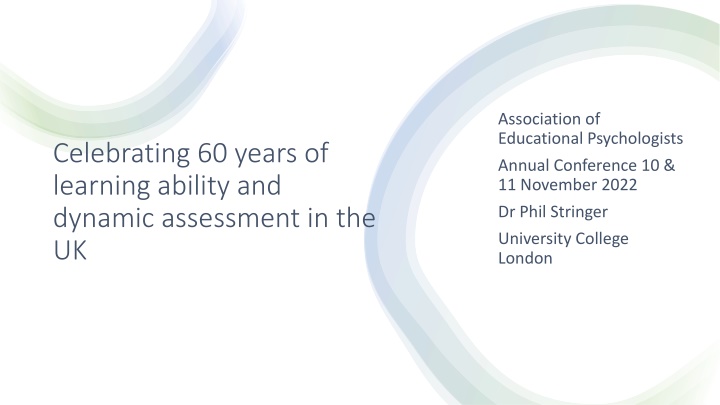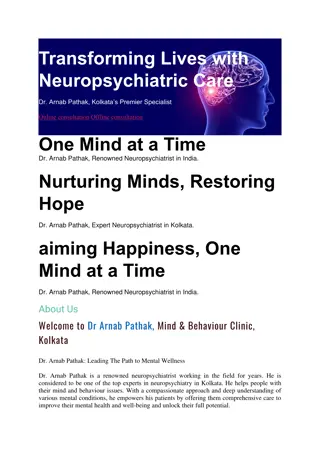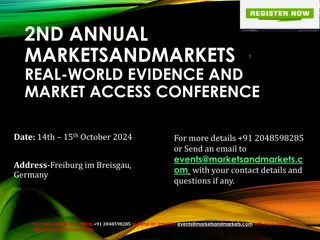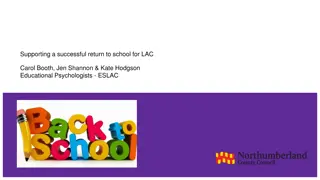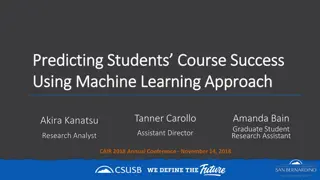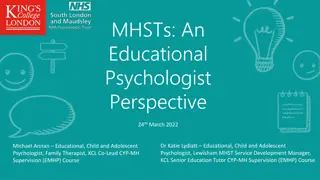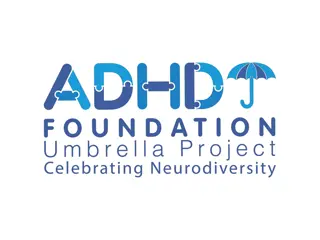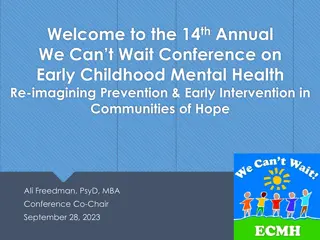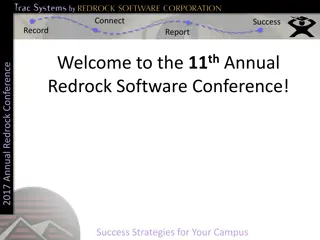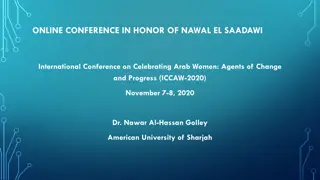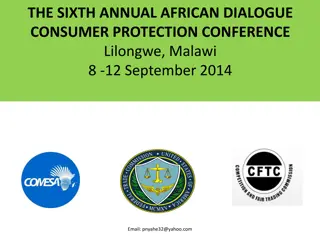Celebrating 60 Years of Learning: Educational Psychologists' Annual Conference
The Association of Educational Psychologists in the UK is commemorating 60 years of advancing learning ability and dynamic assessment. Topics include the importance of theory, historical reflections, and key themes like assessment approaches and cognitive development frameworks such as Vygotsky's Zone of Proximal Development. The event emphasizes the significance of integrating theory with applied psychology for practical solutions.
Download Presentation

Please find below an Image/Link to download the presentation.
The content on the website is provided AS IS for your information and personal use only. It may not be sold, licensed, or shared on other websites without obtaining consent from the author.If you encounter any issues during the download, it is possible that the publisher has removed the file from their server.
You are allowed to download the files provided on this website for personal or commercial use, subject to the condition that they are used lawfully. All files are the property of their respective owners.
The content on the website is provided AS IS for your information and personal use only. It may not be sold, licensed, or shared on other websites without obtaining consent from the author.
E N D
Presentation Transcript
Association of Educational Psychologists Celebrating 60 years of learning ability and dynamic assessment in the UK Annual Conference 10 & 11 November 2022 Dr Phil Stringer University College London
Why is this important? Notes about theory and definitions My learning and charting the history My plan Key themes Celebrating 60 years Conclusions today and tomorrow
Remembering our history Learning from our history Celebrating our history Why is this important?
The greatest handicap of applied psychology has been the fact that, without proper theoretical help, it had to follow the costly, inefficient, and limited method of trial and error. This can be accomplished in psychology, as it has been accomplished in physics, if the theorist does not look towards applied problems with highbrow aversion or with a fear of social problems, and if the applied psychologist realizes that there is nothing so practical as a good theory. A note about theory (Lewin, K., 1951)
Notes about definitions Assessment Dynamic assessment Vygotsky and the Zone of Proximal Development The approach of Feuerstein and Mediated Learning Experience
Assessment is a process and here, approaches under the DA umbrella DA an assessment of thinking, perception, learning, and problem-solving by an active teaching process aimed at modifying cognitive functioning. (Tzuriel, 2001, p.6, italics in original) ZPD: is the distance between the actual development level as determined by independent problem solving and the level of potential development as determined through problem solving under adult guidance or in collaboration with more capable peers. (Vygotsky, 1978, p.86) There must be a surmountable cognitive challenge, teaching (and learning) leads development Definitions
Definitions: The approach of Feuerstein Structural cognitive modifiability Our cognitive functioning and cognitive structures can be modified Mediated Learning Experience (MLE) processes explain cognitive modifiability better than do unmediated experiences (Tzuriel, 2001, p.24) MLE is an interactional process in which an adult interposes him or herself between the child and a set of stimuli and modifies them by affecting their frequency, order, intensity, and context DA (Tzuriel, 2001, p.24, my italics) MLE comprises 12 criteria, 3 of which are essential
There is nothing so practical as a good theory Mediated learning experience has wide applications, including how history and culture is mediated and how we all learn and develop MLE distinction between cultural difference and cultural deprivation My learning As a profession, we are generally deprived of an adequate mediation of our history Hence a perpetual sense of questioning our professional role and identity Celebrating a history of learning ability and dynamic assessment and its contribution to respecting cultural difference and inclusion
My history Vygotsky trainee EP - UCL theory led practice Leicester and NFER Tests of Learning Ability Newcastle and DA Hampshire manifesto - resolving my professional role and identity Black lives matters, Steve McQueen s Small Axe Education, an anniversary, history matters and there is a story worth telling Plunging into it focus on UK writing by EPs and others articles, books, chapters, dissertations, theses, project reports Identifying themes and subthemes Charting the history
Decade of publication 1960s 1970s 1980s 1990s 2000s 2010s 2020s Number 1 3 16 19 23 27 5 Number of publications by decade
Tests of learning ability and a cul-de-sac in the UK Enduring Vygotskian influences Conceptualising learning potential Feuerstein and collaborators theory and practice a slow burn Themes and subthemes early accounts general overviews EP practice, take up and challenges research and evaluations EY assessment applications to specific populations with SEND applications beyond DA
G.W.S. Mackay A study of the prediction of learning ability in the primary school (MA thesis) G.W.S. Mackay & P.E. Vernon The measurement of learning ability (a paper based on the above) Judith Haynes Educational assessment of immigrant pupils Seamus Hegarty Manual for the NFER Test of Learning Ability Rajinder Gupta The assessment of the learning efficiency of Asian children Tests of learning ability 1961 1962 1971 1978 1983
In the USA and Europe, tests of learning ability and standardised dynamic tests Values driven, needs led and highly motivated Theoretical and practical limitations A failure to gather momentum Strong competitors Tests of learning ability and a UK cul- de-sac
The role of the social environment and adult-child interaction, the ZPD, teaching experiments 1970s-1980s Andrew Sutton Vygotskian psychology focus on teaching 1990s-2000s Harry Daniels 1984 up close in Moscow 1993 Ingrid Lunt The practice of assessment, Vygotsky & Feuerstein 1998 Sara Meadows & Phil Stringer Children learning to think, a Vygotskian dialogue Vygotskian influences
Themes in Vygotskian accounts Individual difference and change is viewed qualitatively rather than Western quantitative view Vygotsky s three factor view of cognitive development: heredity, environment, social interaction (which can override the first two) The Zone of Proximal Development, scaffolding Teaching and learning leads development Implications for educators, assessment, teaching experiments, DA Education to prepare citizens of the future to be included in society and tackle unforeseen problems
Maurice Tyerman (1986) Bob Burden (1987a&b; 1994) Howard Sharron (1987) Early accounts Julian (Joe) Elliott (1993) Ruth Birnbaum & Ruth Deutsch (1996) Joe Elliott, Fraser Lauchlan, Phil Stringer (1996 and different author combinations, 1997) Amanda Douglas (1996); Mo Bham et al. (1997); Nicky Brooks (1997); Louise Greatrex (1997); Joanne Statham (1998) Fraser Lauchlan (1999)
Themes in the early accounts Limitations of standardised assessment, including cultural bias, focus on current functioning, difficulties in investigating potential to learn Assessment practice in culturally diverse contexts Interest in cognitive and metacognitive processes and finding ways to help children how to learn effectively, learning potential The theoretical and practical approach of Feuerstein and colleagues, David Tzuriel, Carol Lidz, instrumental enrichment, the LPAD, mediation Use in EP practice and role in casework Illustrative case studies and empirical studies
Judy Waters & Phil Stringer (1997) Judy Waters (1999) Use of DA in the early years Zahirun Sayeed & Ellen Guerin (2000) Helen Squibb (2005) Sobia Hussain (2017) Hussain & Kevin Woods; Hussain, Woods & Christine Williams (2019)
Themes in early years DA Applying Vygotskian theory and Feuerstein's approach to assessing young children The Bunny Bag (Waters) Use of David Tzuriel s and Carol Lidz s materials Play-Based Assessment (Sayeed & Guerin) Empirical studies (Squibb, Lets Play ; Hussain, use of DA by EPs in the early years foundation stage)
UK practice now almost entirely influenced by Feuerstein and Tzuriel Emphasises a clinical, qualitative dynamic assessment approach rather than a quantitative dynamic testing approach DA is theoretically and conceptually driven with standard procedures Addresses the fundamental question: In a culturally diverse country, how does this child learn and how can we help them to be a more effective learner? Research, empirical studies and illustrative case study accounts More EPs use DA and are finding broader applications Access to training and a culture of enthusiasm and encouragement Celebrating 60 years, today and tomorrow
Sixty years of the AEP should be celebrated for contributing to the spread of professionalism, professional thinking and professional discourse Sixty years of writing about developments in DA in the UK should be celebrated for its distinctive approach to practice What will tomorrow bring? The zone of proximal development defines those functions that have not yet matured but are in the process of maturation, functions that will mature tomorrow but are currently in embryonic state (Vygotsky 1978, 86) Conclusions today and tomorrow
References Lewin, K. (1951). Field theory and social science: selected theoretical papers. Chp. VII Problems of research in social psychology (1943 to 44). My copy: Lewin, K. (1997). Resolving social conflicts and field theory in social science. Washington, DC: American Psychological Association. Tzuriel,D.(2001).Dynamicassessmentofyoungchildren.NewYork,NY: KluwerAcademic/PlenumPress. Vygotsky,L.(1978). Mindinsociety.Cambridge,MA:Harvard UniversityPress. p.stringer@ucl.ac.uk
